2013标高二必修Book 5 Unit 4 Making the news
人教版高中英语必修五Unit4 Making the news.doc

高中英语学习材料***鼎尚图文理制作***Unit4 Making the news单项选择题1.【原创】The victims suffering from the terrible earthquake have to be provided accommodations if they ________.A.have survived B.are to surviveC.would survive D.will survive【解析】be to do...意为:注定要发生。
【答案】B【教材原句】His discussion with his new boss,Hu Xin(HX),was to strongly influence his life asa journalist.2. 【原创】The headmaster demanded that the teachers present ________ every effort to protect the students against being injured at the sports meeting.A.made B.would make C.to make D.make【解析】解析:句意:校长要求参加会议老师都要努力保护参加运动会的学生,以免受到伤害。
demand “要求”,后接that从句时,从句用虚拟语气,即“(should+)动词原形”。
【答案】D【教材原句】It was a dilemma because the footballer could have demanded damages if we were wrong.3.【2012•福州模拟】You may ________ it that he will turn up and offer help in time. A.decide on B.depend onC.answer for D.see to【解析】句意:你可以相信,他会及时赶来帮忙的。
高中英语必修五教案Unit4Makingthenews

高中英语必修五教案Unit 4 Making thenews一、教学内容本节课选自高中英语必修五教材Unit 4 Making the news,内容包括:1. Reading and vocabulary:课文“The editor's letter”和“Journalism”;2. Grammar:现在进行时、现在完成时和过去完成时的被动语态;3. Listening and speaking:采访技巧和新闻播报;二、教学目标1. 能够理解课文内容,掌握新闻行业的专业词汇和表达方式;2. 能够运用现在进行时、现在完成时和过去完成时的被动语态进行采访和新闻报道;3. 提高学生的听说能力和写作能力,培养其新闻素养。
三、教学难点与重点1. 教学难点:现在进行时、现在完成时和过去完成时的被动语态的运用;四、教具与学具准备1. 教具:多媒体设备、PPT、黑板、粉笔;2. 学具:教材、笔记本、词典。
五、教学过程1. 导入:通过展示新闻图片和播放新闻视频,引起学生对新闻行业的兴趣,引出本节课的主题;2. 阅读课文:让学生阅读课文“The editor's letter”和“Journalism”,并回答相关问题;3. 词汇学习:讲解新闻行业的专业词汇,让学生进行词汇练习;4. 语法讲解:通过例句和练习,让学生掌握现在进行时、现在完成时和过去完成时的被动语态;5. 听力练习:播放采访和新闻播报的音频,让学生练习听力并模仿;6. 口语练习:组织学生进行角色扮演,模拟采访和新闻播报;六、板书设计1. 新闻词汇;2. 现在进行时、现在完成时和过去完成时的被动语态;3. 采访技巧和新闻播报要点;七、作业设计1. 作业题目:根据课堂所学,编写一篇关于学校活动的新闻稿。
答案:略。
例子:People are interviewing the famous actor now.答案:The famous actor is being interviewed people now.八、课后反思及拓展延伸2. 拓展延伸:鼓励学生关注国内外新闻,了解不同类型的新闻报道,提高英语新闻阅读能力。
高二英语必修五_unit4_making_the_news
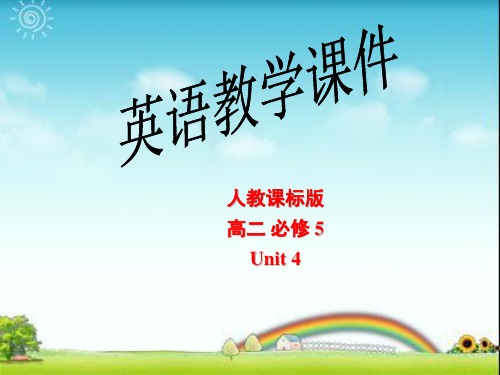
designers
lays out the article and photographs
printer
prints the newspaper
Types of jobs
What it involves
journalist
Interview people or finds out events from onlookers and writes news stories
Task 2 Scanning Decide if each of the following statements about Zhou Yang is true or false. If it is true, please find out a sentence from the passage to prove it.
□
□
8 Ability to work in a team
□
□
□
Look at the title and the picture. What do you think would make the first day at work “unforgettable”? • Doing things very special or meeting somebody very important • Feeling very strange and uncomfortable • Not dressed correctly for the job or dropping food or drink and feeling embarrassed
Guess the meaning of these expressions cover a story have a “nose” for a story a trick of the trade get the fact straight get the wrong end of the stick how the story goes a real “scoop”
高二英语必修五Unit 4 making the news(精编22页课件)
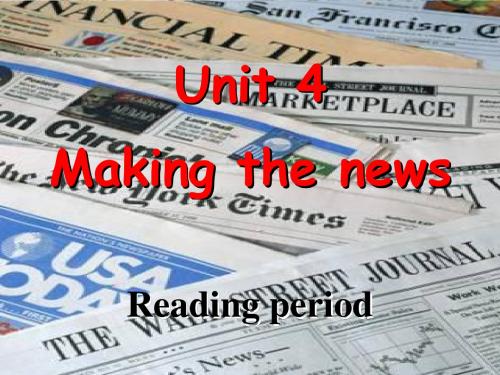
Careful reading
tell They must use research to inform themselves of the missing parts of the story. ★
Analyze the sentence
Not only am I interested in photography, but I took an amateur course at university to update my skills.
Careful reading
What does have a good “nose” for a story refer to ? ★ judge or decide You must be able to assess when people are not telling the whole truth and then try to discover it.
someone who takes photos of important events someone who decides on the content of the newspaper
Chief editor is
READING
MY FIRST WORK ASSIGNMENT “Unforgettable,” says new journalist
4. What should I keep in mind?
5. Why is listening so important?
6. How can I listen carefully while taking notes? 7. Have you ever had a case where someone accused your journalists of getting the wrong end of stick? 报道失实
高二英语:必修5 Unit 4 Making the news语法教案(实用文本)
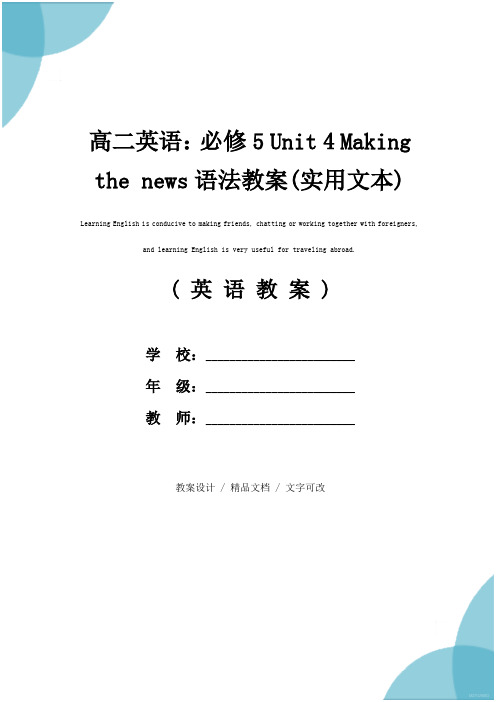
( 英语教案 )学校:_________________________年级:_________________________教师:_________________________教案设计 / 精品文档 / 文字可改高二英语:必修5 Unit 4 Making the news语法教案(实用文本) Learning English is conducive to making friends, chatting or working together with foreigners, and learning English is very useful for traveling abroad.高二英语:必修5 Unit 4 Making the news语法教案(实用文本)必修5 unit 4 making the news语法教案一. 教学目标 (teaching aims)1. 能力目标 (ability aim)enable the ss to recognize the variety of jobs there are in newspapers and what is needed to work in a newspaper office.enable the ss to know what is needed to become a reporter and how to conduct an interview.2.. 语言目标 (language aim)重点词汇和短语occupation, do research, on one’s own, cover, concentrate on, acquire, accuse…of, so as to, scoop重点句子1)not till you are more experienced!2)you’ll find your colleagues very eager to assist you and if you are interested in photography, it may be possible for you to concentrate on that later on.3)not only am i interested in photography, but i took a course at university, so it’s actually of special interest to me.4)only if you ask many questions will you acquire all the information you need to know.5)we say a good reporter must have a “nose” for a story.6)this is a trick of the trade.7)have you ever had a case where somebody accused your reporters of getting the wrong end of the stick?8)perhaps i too will get a scoop!二. 教学重难点 (teaching important points)know what is needed to become a reporter and how to conduct an interview三. 教学方法 (teaching method)fast reading; task-based method & discussionperiod3 grammar (倒装句)step1.定义:在英语中,主语和谓语的语序通常是主语在前,谓语在后。
“高中英语必修五Unit4《Makingthenews》教学课件”

练习新闻写作技巧
通过小组和个人写作任务,练习新闻写作技巧,提升自己的报道能力。
分析和讨论当前新闻
通过分析和讨论当前新闻报道,深入理解新闻报道的各个方面。
总结和成功策略
总结重点内容和成功策略,为新闻写作打下坚实基础。
关键词和短语
• 新闻报道 • 新闻文章写作 • 倒金字塔结构 • 采访技巧 • 社会伦理
新闻类型
1. 新闻报道 2. 特写报道 3. 评论报道 4. 分析报道
提供事实细节和核心信息。 深入探讨一个主题,展现细节和人物。 对事件、问题或议题发表个人观点和评论。 对事件进行构
新闻报道采用倒金字塔结构,即先传递最重要的信息,然后逐渐降低重要性。 这样读者可以在最短时间内获取关键信息。
引用和归属
引用和归属是新闻报道中常用的技巧,可以增加报道的可信度和权威性。
采访技巧
• 提出开放式问题来引导受访者提供详细信息。 • 细心聆听并记录关键细节。 • 考虑受访者的观点和背景。
1
1. 谁
确定新闻报道的主要人物或当事人。
2. 什么
2
阐明事件或故事的核心信息。
3
3. 在哪里
指明事件发生的地点或背景。
4. 何时
4
说明事件发生的具体时间或时间范围。
5
5. 为什么
解释事件发生的原因或动机。
6. 如何
6
描述事件的过程和发展。
标题和引导段落
标题和引导段落是吸引读者注意力的关键。精确、简洁的标题和引导段落能 够准确传达新闻的核心信息。
新闻报道的伦理问题
新闻报道需要考虑隐私权、诚实和平衡等伦理问题,以确保报道的公正性和 准确性。
调查新闻
调查新闻在揭露腐败、追究责任方面起着重要作用,对社会产生深远影响。
人教版高中英语必修五 Unit4 Making the news-词汇篇(学生版)-最新教学文档

Unit4 Making the news-词汇篇__________________________________________________________________________________ __________________________________________________________________________________1. 掌握重点词汇的搭配及用法,能够正确完成基础类型题。
2. 掌握重点句型的用法,会模仿句型进行写作和翻译。
重点单词详解1. acquire vt .获得;取得;学会教材原句P 26:Only if you ask many different questions will you acquire all the information you need to know.只有当你问了许多问题的情况下,你才能够得到你需要的所有信息。
(1)acquire a knowledge of...获得……的知识acquire a habit of...养成……的习惯acquire a taste for...开始喜欢上……(2)acquisition n . 获得;得到acquired adj .已取得的;后天获得的①As far as I know, she has acquired a good knowledge of English.据我所知,她英语已经学得很好。
②Although having acquired some general achievement, the professor was still dissatisfied in his research.虽然已经取得了一些阶段性成果,教授仍旧对自己的研究不很满意。
③Having read the book ,she will be able to pass on the acquired knowledge to her students. 读完此书,她便能将从书中所得传授给她的学生。
高二英语必修5Unit4 Making the news 新课标 人教版 教案
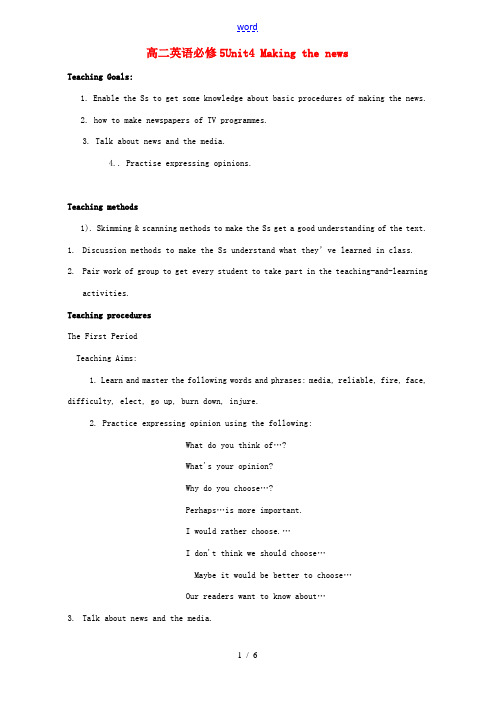
高二英语必修5Unit4 Making the newsTeaching Goals:1. Enable the Ss to get some knowledge about basic procedures of making the news.2. how to make newspapers of TV programmes.3. Talk about news and the media.4.. Practise expressing opinions.Teaching methods1). Skimming & scanning methods to make the Ss get a good understanding of the text.1.Discussion methods to make the Ss understand what they’ve learned in class.2.Pair work of group to get every student to take part in the teaching-and-learningactivities.Teaching proceduresThe First PeriodTeaching Aims:1. Learn and master the following words and phrases: media, reliable, fire, face, difficulty, elect, go up, burn down, injure.2. Practice expressing opinion using the following:W hat do you think of…?What's your opinion?Why do you choose…?Perhaps…is more important.I would rather choose.…I don't think we should choose…Maybe it would be better to choose…Our readers want to know about…3.Talk about news and the media.4. 4. Train the students' listening and speaking abilities.Teaching Important Points:1. Master the useful words and expressions appearing in this period.2. Train the students' listening and speaking abilities by talking about news and the media.Teaching Difficult Points:1. How to help the students understand the listening material exactly.2. How to help the students finish the task of speaking.Teaching Methods:1. Listening-and-answering activity to help the students go through the listening material.2. Individual, pair or group work to make the students finish each task.Step I Greetings and Lead-inT: Good morning/afternoon, class.Ss: Good morning/afternoon, Miss/ Mr. X.T: Sit down, please. Being the members of the society, we all cares for/about what happens around us or even what happens at home and abroad. How can you do so?Ss: By reading newspapers and magazines, watching TV programmes,listening to the radio.T: Are there any other ways? Think it over.Ss: By a website.T: Ye s. It’s also a way to learn about the world. What do you call these things which help us know about to the world?Ss:新闻媒体T: In English, we call it news media. First, let's learn the new words in this period. Look at the screen.(Teacher first asks some students to read the words on the screen. Correct the Ss' mistakes in pronunciation. Then teacher gives brief explanations. At last, let the Ss read and remember them for a while.)Step ⅡWarming up T: Well, now please open your books at Page 9. Warming up first. Look at each of the pictures and tell me which kind of news media it shows?Ss: The first picture shows a website; the second one shows radio; the third one shows TV programmes; the fourth one shows magazines; the fifth one shows newspapers.T: Quite right! Now, please work in groups of four and discuss the five questions below the pictures. A few minutes later, I’ll check your answers. OK?Ss: OK.T: You can begin now.(A few minutes later. )T: Are you ready now?Ss: Yes.T: Which group would like to talk about the first question? Choose one member of your group to answer the question.S1: I think TV is the most reliable among the news media. TV consists of a series of lively consecutive pictures. For the peoplewho want to know what is exactly happening, a picture responds better to offer the truth of a fact than the mere words upon a page. It can offer an unique function of seemingly on-the-spot feeling, which is not available to the othermedia.T: The second question?S2. I think TV programmes are easy for most people to understand. Radio, c an only be heard and sometimes can’t be picked up clearly. Newspapers and magazines are only useful for people who can read. Websites have many different pages, but you should be carefulto read some of the pages. who can read. Website have many different pages, but you should be careful to read some of the pages.T: The third question?S3 : I will check other sources.T: The fourth question?S4: Every morning, the newspaper chief editor and the journalists discuss the main events of the day. Reporters are then sent to cover the events. They usually do some interviews and then check the information. They must work very fast. Later in the day, everything is put together at the news desk. Then the editors read the stories and make any necessary changes and choose a good title for eachstory. At last, they print them quickly and deliver them. Making a magazine is more or less the same as making a newspaper. But the articles in a magazine are more like stories, which are writtenby all kinds of writers. Magazines are not published as quickly as newspapers.T: The last question?Ss: News broadcast, newspaper, magazine, radio programme, website,report, reporter, edito r, interview, write articles…Step Ⅲ Listening T: Next, let's e to the Listening. We are going to listen to two parts of conversations. The first part is an interview; the second part is a dialogue. Now, look at Exercise 1:Listen carefully towhat is said and tick the information you hear in each part. If necessary, I'll play it twice. (Teacher begins to play the tape, and checks the answers after listening. Then ask the students to finish the rest of the tasks. )T: OK. Now, please listen to each part once again and then work inpairs to talk about the questions in Exercises 2,3,4 and 5. Are youclear?Ss: Yes.(Teacher allows them enough time to talk about the questions. Thenask some students to say their answers.)Step IV SpeakingT:Well,now it's time for us to be the editors of a newspaper. Here is a list of ten things that happened today. Look at the screen. (Teacher shows the screen and read through the list to the whole class.)200 people died in an earthquake in Turkey.China beat Brazil 5-1 in football.France elected a new President.Three children from your city were killed.Someone robbed a bank in Shanghai.Food prices are going up.A house in your town burned down. Nobody was injured. 2 000 people in your city were happy today and moved into new buildings. A Chinese scientist has invented a new car engine that does not pollute the air. There is a rumor that a large pany wants to build a factory in your town:(Bb :go up, burn down)T: Now, you've known the ten things, but you only need to reportfive of them. So, first decide which events you are going to put in your newspaper. Then give reasons for your choices and pare with your classmates.Work in groups of four or five. And the following expressions on the screen can help you with your dialogue. After a while, I'll ask some of you to act out your dialogue.(Teacher shows the screen. )What do you think of'…?I would rather choose.…What's your opinion?I don't think we should choose…Why do you choose…Maybe it would be better to choose…Perhaps… is more important.Our readers want to know about….(Teacher goes around the Ss and checks their work. If necessary, teacher may join in them. )。
高二英语人教版必修5课件:Unit 4 Making the News (Reading)
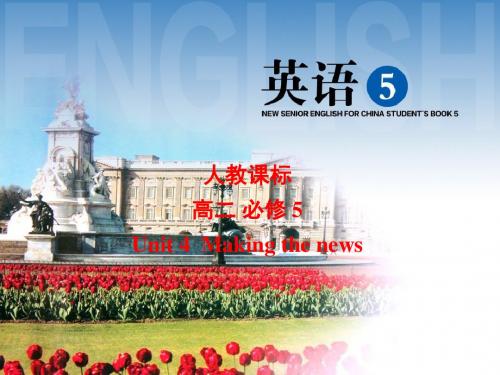
Questions: How to get an accurate story Suggestions ★Be cautious. ★Ask different questions so as to 4. ________ acquire all the information needed. ★Have a good 5. ______ nose for the story. ★Use 6. ________ research to find out the missing parts of the story.
What is she?
What does an editor do? Making sure the writing is clear, concise and accurate; checking facts.
What is he?
What does a photographer do? Taking photographs of important people or events.
Questions: How to protect a story being challenged
Suggestions
If the interviewee agrees, you can use a(n) 9. ______ record to get the facts straight, which can offer 10. ________ evidence to support your story.
1. Zhou Yang needs a camera to become a good journalist. 2. A journalist needs to be curious. 3. A journalist shouldn’t be so talkative but listen carefully. 4. A journalist should listen carefully while taking notes. 5. Zhou Yang has got a real scoop.
人教新课标高中英语必修五Unit 4 Making the newsUnit 4 Making the news教案(5)
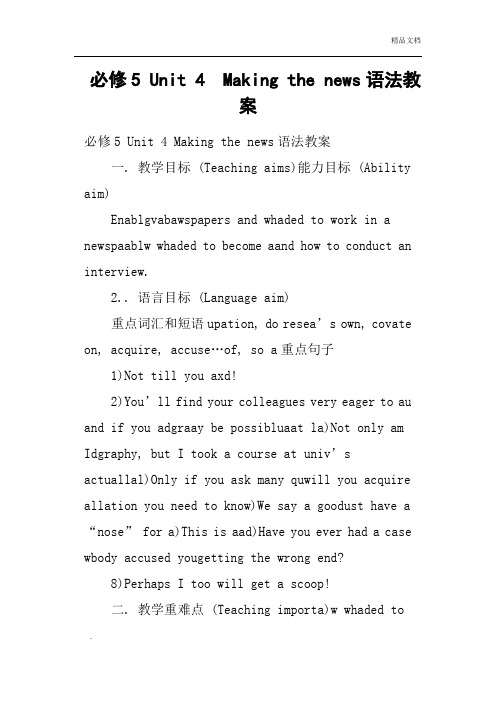
必修5 Unit 4 Making the news语法教案必修5 Unit 4 Making the news语法教案一. 教学目标 (Teaching aims)能力目标 (Ability aim)Enablgvabawspapers and whaded to work in a newspaablw whaded to become aand how to conduct an interview.2.. 语言目标 (Language aim)重点词汇和短语upation, do resea’s own, covate on, acquire, accuse…of, so a重点句子1)Not till you axd!2)You’ll find your colleagues very eager to au and if you adgraay be possibluaat la)Not only am Idgraphy, but I took a course at univ’s actuallal)Only if you ask many quwill you acquire allation you need to know)We say a goodust have a “nose” for a)This is aad)Have you ever had a case wbody accused yougetting the wrong end?8)Perhaps I too will get a scoop!二. 教学重难点 (Teaching importa)w whaded tobecome aand how to conduct an interview三. 教学方法 (Teaching method)Fast reading; Task-based method discuPeriod3 Grammar (倒装句)定义:在英语中,主语和谓语的语序通常是主语在前,谓语在后。
book5unit4makingthenews全单元教案(新课标版高二英语必修五教案教学设计)

book5 unit4 making the news全单元教案 (新课标版高二英语必修五教案教学设计)单元教学目标talk about jobs in a newspapertalk about the basic qualities and skills a journalist should havelearn about the writing and printing process for an article and what is the primary source and the second source learn how to use Inversion correctlylearn how to make an appointmentwrite a newspaper article教材重组及课型设计1st period Reading(整合warming up, Pre-reading, Reading 与 Comprehending 四部分)2nd period words & expressions(整合Learning about Language 中的Discovering useful words and expressions与Workbook中的Using words and expressions)3rd period Grammar(整合Learning about Language 中的 Discovering Structures 与 Workbook中的 Using Structures)4th period Extensive Reading(整合Using Language 中的Reading与Workbook中的Reading Task)5th & 6th period Speaking and Writing ((整合Workbook中的 SPEAKING TASK and WRITING TASK)7 th period Listening and Speaking(整合Using language 中的Listening and Speaking 与Workbook中的 Listening, Talking)The 1st Period Reading(整合warming up, Pre-reading, Reading 与 Comprehending 四部分)Teaching Aims:1.Enable the students to talk about the qualities needed to be a good reporter and how to conduct a good interview2. Enable the students to learn some reading strategies3. Enable the students to learn the necessary qualities in their future jobImportant Points and difficult pointsLearn about how to be a good reporterTeaching methodsStrategic reading method; Task-based methodTeaching procedures:I. Elaboration (warming up): Help the students to relate their known knowledge to the topic that will be learnedTask 1 :( group discussion) Talk about jobs in China Daily?Types of jobs What it involvesreporterTask2: Predict what is going to be learned by looking at the title of the text. Which type of job will be talked about in the text?II. Prediction (pre-reading):Task 3: Predict the main idea of the text by discussing the following questions:1. What are the qualities a good news reporter needs to have?(Have group discussion first and then finish Part 1 individually)2. What your first day at school was like? How would you feel on your first day at work? (Group discussion)III. Skimming, scanning, analyzing (Reading & Comprehending)Task 4: Read the text quickly to get a general idea of the text.Task 5: Divide the passage into three sections and match the following main ideas to the three sections:How to get an accurate storyHow to protect a story from accusationsHow to become a reporterThe skills neededThe importance of listeningStages in researching a storyHow to check factsHow to deal with accusations of printing liesWork in a teamTask 6 Read quickly to find out the information to fill in the form belowTask 7: Tell what is required for a reporter and a photographerpatient; imaginative ; well-organized; technically good; polite; concise; thorough; creative; curious; careful; gifted; professionalA reporter A photographerIV. SummarizingTask 8: Write a summary of the textV. AssignmentRead an English newspaper and retell the main idea of one article in it.The 2nd Period Words & ExpressionsTeaching Aims:Get the students to know how to use some words and expressions correctly and appropriatelyImportant Points and difficult pointsUse some words and expressions correctly and appropriately Teaching methodsDemonstrating and summarizing; practicingTeaching procedures:1. occupation n.1). Teaching is my occupation. 职业2). Swimming is my occupation. 使…忙碌的事情;消遣occupy v.occupied=busyoccupy oneself in/with sth.employment; occupation; job; profession; vocation; work; tradeHe is looking around for .: artistHe is out of .She chose teaching as her .She’s a lawyer by .He’s a carpenter by .2. assign v.assignment n.She gladly accepted the assignment. (分派的任务;工作)The English assignment is a book report. (课外作业,功课)3. on one’s ownof one’s ownfor one’s ownWe should complete the test _________4. experienced adj.be experienced in/at sth/doing sth.Who is experienced in cooking in your home?5. The first/last time + 时间状语从句The first time I came here, I was not used to the climate here. Cover n. 封面,掩盖(物) ;展开全文阅读 v.1). Tom will covered the outbreak of the disease.2). The road was covered with snow.3). She laughed to cover her worry.4). The red army covered about 30 miles a day.5). Is the money enough to cover the cost of a new shirt? 7. Be eager for sth. (sucess)to do sth.that clauseHe is eager to see his daughter.We are eager that the project should be started earlybe anxious about =be worried about8. Concentrate on sth./doing sth.We should concentrate on our study.Tom is concentrating on fishing.9. of +抽象名词(importance; value; use; help; benefit)of special interest=of no use=The meeting is of great importance.=Each minute is _____ for us.of greatly valuablegreat valuableof great valuefor much value10. acquire; get; gain1). I sat in the front of the bus to ___ _ a good view of thecountryside.2). Gradually we _______ experience in how to do the work.3). They _____the victory after a bloody battle.11. have a nose for 嗅觉灵敏She has an ear for music. 有鉴赏能力She has an eye for color and style in clothes. 有眼光12. Meanwhile=in the meanwhile=in the meantime=at the same timeMother went shopping; meanwhile, I cleaned the house13. trade n. v.1). Japan does lots of trade with the United States.2). He is a shoemaker by trade.3). She trades 3 apples for some bananas.14. Trick1). 窍门,手法2). play a trick(joke)on sb.=make fun of sb. (玩笑,恶作剧)3). He got into the building by a trick (诡计,花招)15. Challenge1).He challenge my view on that matter.2).To finish the job in 2 days was a real challenge.16. Supportn. 1).I need your support.v. 1)为…提供证据,证实2) The old man entered the room supported by his grandson.3). He has always supported the weaker party.4). He has a large family to support.17. Case1).He thought he had solved the problem , but that was notthe case.2).Here is a case of being careless.3).We will look into that case.in case of sth. 如果,万一…in that/this case 在那样/这样情况下in no case 决不in case + 从句以防;可能;倘若Take an umbrella in case it rains.(in case 从句常用一般现在时表将来, 或should+do)17. accuse sb. of sth.=charge sb. with sth.Tom ____ his boss of having broken his word.blamedaccusedchargedscolded18. so as to do sth. 只能在句末= in order to do sth.=so that + 从句= in order that + 从句I got up at five so as to catch the train=19. admitadmit doing /having doneadmit sb. Into/to (the university)Lily finally admitted___ my umbrella by mistake.to taketo have takenhaving takenhave taken20. n. adj.profession professional 具有….特点Finish Ex 3 on Page 29AssignmentFinish Ex1 and Ex 2 on Page 28 and Ex 3 on Page 29 (Discovering useful words and expressions)Finish Ex 2 , Ex3 on Page 63 and Ex4 on Page 64 (Using words and expressions) in Workbook.The 3rd Period GrammarTeaching Aims:Get the students to use “Inversion” correctly and appropriatelyImportant Points and difficult pointsUse “Inversion” correctly and appropriatelyTeaching methodsTask-based method; Demonstrating; discussion; summarizing; practicingTeaching procedures:I. PresentationTask 1: Comprehend the following sentencesOnly then did I begin my work on designing a new bridge.=I began my work on designing a new bridge only then.2. Not only was there a Christmas tree, but also exciting presents under it.=There was not only a Christmas tree, but also exciting presents under it.Inversion: 起强调作用II. Analyzing & summarizingTask 2: Find 4 examples of inversion in the reading passage1. Never will Zhou Yang forget his first assignment at theoffice of China Daily.2. Only when you have seen what he or she does, can you cover a story by yourself.3. Not only am I interested in photography, but I took a course at university.4. Only if you ask many different questions will you acquire all the information you need to knowTask 3: Analyze the sentences above and summarize the rules1. Why can these sentences use inversion ?2. How are these inverted sentences made?※ 否定副词no;not;hardly, little, seldom, never, no sooner…than, no more, not only, only 等开头的句子要部分倒装。
人教版高二英语必修5Unit4_Making_the_News

2. What was Zhou Yang’s first job at China Daily? An assistant journalist.
True or False 1. Zhou Yang can go out on a story immediately. 2. Zhou Yang needn’t take a camera with himself.
painter printer photograph编
sub editor 审校编辑
critic 评论员
cartoonist 漫画师 correspondent 通讯员
How many sections are there in a newspaper?
Local news International news Business section Entertainment Advertisement …
Summary
unnecessary To the reporters,it’s ____________for them to take a photographers camera because they have professional _______________________ with them. The reporters should be _______ curious and they nose for a story.They know how to must have a _____ acquire _______the information they need.While interviewing, they won’t _______, be rude they won’t ____________ talk too much themselves , and they should ________ listen to the answers carefully .They will listen to the _______ detailed facts and ask trade new questions. There is a trick of the______,that is ,with the permission of the interviewee, they would recorders which could keep the evidence to use small _____________ support help ________their story.
新人教版英语高二上Module5Unit4Makingthenews
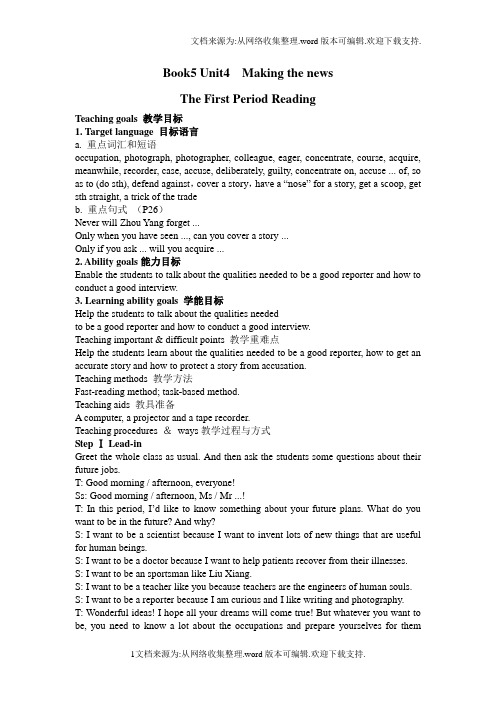
Book5 Unit4 Making the newsThe First Period ReadingTeaching goals 教学目标1. Target language 目标语言a. 重点词汇和短语occupation, photograph, photographer, colleague, eager, concentrate, course, acquire, meanwhile, recorder, case, accuse, deliberately, guilty, concentrate on, accuse ... of, so as to (do sth), defend against,cover a story,have a “nose” for a story, get a scoop, get sth straight, a trick of the tradeb. 重点句式(P26)Never will Zhou Yang forget ...Only when you have seen ..., can you cover a story ...Only if you ask ... will you acquire ...2. Ability goals能力目标Enable the students to talk about the qualities needed to be a good reporter and how to conduct a good interview.3. Learning ability goals 学能目标Help the students to talk about the qualities neededto be a good reporter and how to conduct a good interview.Teaching important & difficult points 教学重难点Help the students learn about the qualities needed to be a good reporter, how to get an accurate story and how to protect a story from accusation.Teaching methods 教学方法Fast-reading method; task-based method.Teaching aids 教具准备A computer, a projector and a tape recorder.Teaching procedures &ways教学过程与方式Step Ⅰ Lead-inGreet the whole class as usual. And then ask the students some questions about their future jobs.T: Good morning / afternoon, everyone!Ss: Good morning / afternoon, Ms / Mr ...!T: In this period, I’d like to know something about your future plans. What do you want to be in the future? And why?S: I want to be a scientist because I want to invent lots of new things that are useful for human beings.S: I want to be a doctor because I want to help patients recover from their illnesses. S: I want to be an sportsman like Liu Xiang.S: I want to be a teacher like you because teachers are the engineers of human souls. S: I want to be a reporter because I am curious and I like writing and photography. T: Wonderful ideas! I hope all your dreams will come true! But whatever you want to be, you need to know a lot about the occupations and prepare yourselves for themfrom now on.Step Ⅱ Warming UpT: Suppose you want to work for a newspaper and you are offered a chance for a job at China Daily. Do you know what kind of jobs they have at their office and what each job involves? Here is a list of different types of jobs at China Daily.Show the table on the screen.Types of jobs at English newspaperjournalist, editor, reporter, critic,foreign correspondent, photographer, designerAsk the students the following questions one by one.T: Which two words mean the same?S: Journalist and reporter.T: Very good. What does a journalist or a reporter do then?S: A journalist or a reporter interviews people or finds out events from onlookers and writes news stories.T: Great! Next question, who gives opinions on plays and books?S: A critic.T: Quick response! Thank you. What does an editor do then?S: An editor checks the writing and facts and makes changes if necessary.T: What does a photographer do then?S: A photographer takes photographs of important people or events.T: Terrific! Who lays out articles and photographs?S: A designer.T: Well done! Who reports from abroad?S: A foreign correspondent.T: Now if you want to be a good news reporter, what qualities do you think you need to have?S: A higher level of education, enthusiasm and good working skills.T: Creative ideas! Any more?S: The ability to work in a team.T: Great idea! Here I have a list of qualities for you. Please open your books to page 25 and look at Exercise 1 in Pre-reading. Now discuss in groups of four. Tick theboxes you choose. Then add two more qualities you think are important and give your reasons.Two minutes later.T: Now I’d like to hear your voice. Which group would be the first?S: Let me try. Our group agrees that a higher level of education, good communication skills and hard-working are very important qualities. The other three are important qualities. We also think the ability to work in a group and being ready to work irregular hours are important.T: Excellent! Any different ideas?S: We think a higher level of education, curious and active personality and enthusiasm for the job are very important qualities for a good news reporter. The rest are important. Besides, we agree good writing skills and being a good listener are also important.T: Creative thinking! Everyone has unforgettable moments in his / her life. Think about your first day at school, being far away from home, your first day abroad .... Now discuss in groups what the first day would be like, and how you would feel if you were to work for China Daily.Allow the students a few minutes to discuss.T: Anyone would like to share your ideas with us?S: My first day would be an exciting day because the job was what I had been looking forward to getting. So I would feel very excited and eager to start my work as a reporter and go out to interview different people.S: My feelings would be mixed because, on one hand, I would be excited; but on the other hand, I would feel a little nervous. Anyway, I was a green hand and I wasn’t sure about my capability of doing the work.T: Don’t worry! Anyone has his or her first day at work. Just relax! I think as long as you are well prepared, you’ll do fine.S: Thank you.Step Ⅳ ReadingGet the students to do fast reading.T: All right. In this period we are going to learn about a new reporter Zhou Yang who is on his first day of working at the office of a popular English newspaper. Please go through the whole passage as fast as you can and try to find answers to the following three questions.1. Could Zhou Yang go out on a story alone immediately? Why (not)?2. What mistakes must he avoid?3. How did Zhou Yang feel on his first day at work?A couple of minutes later check the answers with the whole class.T: OK. Let’s check the answers. Question 1. Any volunteers?S: I’ll try. The answer is No, not until he was more experienced because there was a lot for him to learn and he must work in a team.T: Correct. The next one, please.S: He must avoid being rude and talking too much himself.T: You got it. Question 3?S: He felt excited and eager to go out on a story.S: He is curious, too.T: Smart conclusion.Step Ⅴ ComprehendingGet the students to carry out the tasks in this part.Task 1 Reading for details and discussionT: Now there are some more tasks for you. Please read the instructions of Exercise 1 on page 27 and then discuss Zhou Yang’s notes. After that, please complete the chart.I will give you three minutes.Three minutes later, check the answers.Task 2 Reading for main ideaT: All right. Now Li Lihong would like you to help her readers understand the duties of a reporter. Read the passage again and divide it into three sections, each of which looks at one duty of a reporter. Then write down the main idea of each section. I will give you two minutes.Two minutes later, check the answers.T: Well done! Now what does the whole passage tell us? What’s the main idea of the passage?S: The passage tells us about the qualities needed to be a good reporter, how to get an accurate story and how to protect a story from accusation.T: Very good. You’ve got it.Task 3 DiscussionLet the students work in pairs to discuss which adjectives in the box on page 27 can be used to best describe what is required for a reporter and a photographer respectively.T: Now please turn to page 27 and look at the adjectives in the box. Please work in pairs to discuss which of them best describe what is required for a reporter and a photographer. Then complete the chart.Five minutes later, check the answers.T: Now we know the qualities for a good reporter and a good photographer. Can you make a good reporter or a good photographer? Why? Any volunteers?S: I think a good reporter needs to be thorough, curious, careful and concise but a photographer needs to be creative, imaginative, technically good and gifted. They both need to be professional, well-organized and patient. I think I would make a good reporter because I am careful and curious.T: Wonderful! You’ve done a good job.Step Ⅵ Summary and HomeworkT: In this period we have talked about the qualities needed to be a good reporter and a good photographer, how to get an accurate story and how to protect a story from accusation. Now here’s homework for today:1. Read aloud the dialogue with your partners. Pay attention to the stress and intonation.2. Read the passage, pay attention to the language points.。
高二必修5 Unit 4 Making the news教案
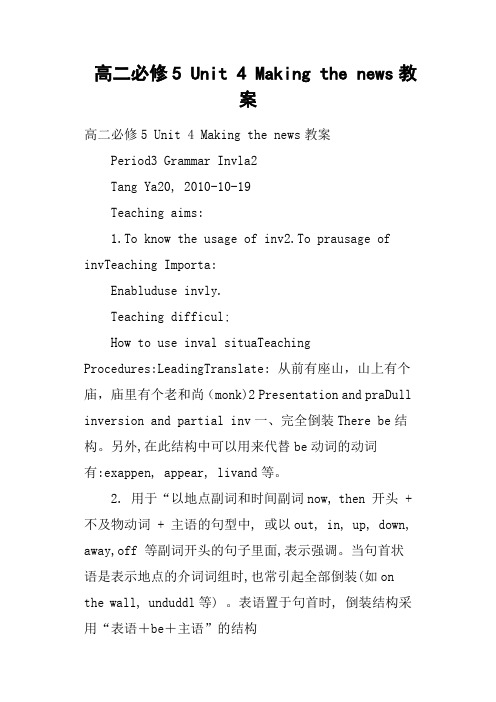
高二必修5 Unit 4 Making the news教案高二必修5 Unit 4 Making the news教案Period3 Grammar Invla2Tang Ya20, 2010-10-19Teaching aims:1.To know the usage of inv2.To prausage of invTeaching Importa:Enabluduse invly.Teaching difficul;How to use inval situaTeachingProcedures:LeadingTranslate: 从前有座山,山上有个庙,庙里有个老和尚(monk)2 Presentation and praDull inversion and partial inv一、完全倒装There be结构。
另外,在此结构中可以用来代替be动词的动词有:exappen, appear, livand等。
2. 用于“以地点副词和时间副词now, then 开头 + 不及物动词 + 主语的句型中, 或以out, in, up, down, away,off 等副词开头的句子里面,表示强调。
当句首状语是表示地点的介词词组时,也常引起全部倒装(如on the wall, unduddl等) 。
表语置于句首时, 倒装结构采用“表语+be+主语”的结构二、部分倒装部分倒装是把be动词、情态动词、助动词放到主语之前。
如果句子中没有这些词,要在主语之前加助动词do / does / did等,而把原来的谓语动词变成原形放在主语之后。
1.用于疑问句。
(部分倒装)2、在以(…也是; …也不是)开头的句子里,此句谓语应与前句谓语的时态形式一致。
ly + 状语(副词、介词短语、状语从句)放在句首时。
(部分倒装)在否定或半否定词放句首表示强调时,部分倒装。
Not only + 分句,but also + 分句"句型中的前一分句要部分倒装。
高二英语必修五课件:《Unit 4 Making the news》

高二英语必修五课件:《Unit 4 Making the news》即使爬到最高的山上,一次也只能脚踏实地地迈一步。
生活的理想,就是为了理想的生活。
下面本文库为您推荐高二英语必修五课件:《Unit 4 Making the news》。
教案【一】教学准备教学目标Objectives:1. Instructional objectivesBy the end of the class, most students are able to:1) Use the words and the phrases they learned to complete the tasks based on the text.2) Pronounce correctly the new words (especially "carnival")by themselves and with the help of the teacher.3) More than half of the students can speak fluently and accurately about their views towards carnival in pairs with the teacher’s scaffolding.2. Educational objectivesBy the end of the class, students are able to:Improve their cultural awareness from carnival and learn more about its influence on the western culture after class3. Personal objectives:1) Be confident of standing on the stage and speak clearly and spontaneously.2) Encourage students to speak in the class with different kind of techniques.教学重难点Focal points:By the end of the class, students are able to:1) Improve the main reading skills through completing reading tasksin pair work and group work.2) Use the table to finish their essay about their favorite film. Difficult points:By the end of the class, students are able to:1) speak fluently and accurately about their favorite films in pairs with the teacher’s scaffolding.2) Write a film review according to the table and the text.教学过程Procedures and time allotmentStage 1 Getting students ready for learningT: Class begins!Ss:…T: Good afternoon, class!Ss:…T: Today,let’s come to Culture Corner. Module 4. Do you know Chinese festivalsSs:…T: First, Work in groups, discuss and make a list of Chinese festivals in English. (1min).Ss:…T: OK, time is up. You know Chinese festivalsSs:…T: very good. For example1.New Year’s Day 元旦节(1月1日)2. Spring Festival 春节(农历正月初一)3. Lantern Festival 元宵节(农历正月15)4. the Qingming Festival 清明节(4月5日)5. Dragon Boat Festival 端午节(农历5月初五6. Double-ninth Day 重阳节(农历9月初九)7.National Day 国庆节(10月1日)T: And festivals brought us much traditional knowledge. So, festival is beautiful. Do you know foreign festivalsSs:...T: In the textbook, there are some festivals with pictures. Do you know the right descriptions about themSs:...T: This festival is at the end of October, when "ghosts" come out. Ss:...T: This is when Americans remember the hard times when they first arrived in the country.Ss:..T: This is a festival of color, which marks the beginning of spring in India.Ss:...T: This is a Christian festival which comes in the middle of winter Ss:...T: Let’s watch a video. Can you guess what festival it is .T: They are dressed up in special clothes, and they are wear masks. Ss:...T: now, First question is how do people feel on this festival Second is what festival is itSs:...T: Yes, very good. Now,let’s watch a video about Carnival.Ss:...T: what do you remember about carnivalSs:...T: Where did it firstSs:...Stage 2 Pre-readingStep 1. Listen to the tape.T: Let’s listen to the following passage to learn more about carnival. Try to find out what places are mentioned in terms of carnival celebrations.Ss:..T:...Step 2. Scan the passage and try to answer the questions.T: What is the meaning of carnivalSs:...T: Originally it meant "with no meat"but now it symbolizes "life".Step 3. Read the passage and match column A with column B.T: OK, now I will give you 1 minute to read it again and then I will ask you someStage 3 While-readingStep 1 Read the passage. Choose the best answers to the two sentences.T: are you finish Let’s look at the questions.first question is Today Carnival has become a celebration of ____. Which one you chooseA. freedomB. harvestC. life itselfD. successSs:...T: YES, very good. Next question is We need to _____ to understand what carnival is all about.A. look at the history of AmericaB. go to AmericaC. look at the meeting of two cultures---European and AfricanD. Both A and CSs:...T:....Step 2 check whether the statements are true or false.T: …T: Now,let’s check.With the opening of huge farms and plantations,many Africans went to look for jobs in America.,what’s your idea Ss:…T: Do you agreeSs:…T: Excellent, in paragraph 2, this marked the beginning of the slave trade. So the question 1 is False.T: next question 2, The Europeans imported their festivals and later the slaves learned from them and added their traditions.Ss:...T: very good. This answer in paragraph 3.Ss:...T: question 3,The slave trade was abolished and the salves took over the carnival.Ss:...T: the last, With the passing of time, carnival became a festival of the black people only.Ss:…T:Exactly! Superb!Step 3 Skimming for specific informationTask: Answer the questions according to the passage.T: Read the text carefully and answer the questions.Next, we will read the text again to explore how the text organized. 3minutes,Let’s go!T: Now,let’s check your answers. What is carnival todaySs:Carnival today is an international, multicultural experience. T:The second question is Where were the slaves taken fromSs:In AfricaT:....T: Excellent!Stage5 Post-readingDiscussion: Useful questions to make up dialoguesT: there have seven questions, useful questions to make up dialogues. Have you dressed up in special clothes2 What did you wear3 How did you feel4 Did you eat special food5 Did you give or receive gifts6 Did you have a holiday from school7 Did you enjoy yourself with your family or friendsT: I will divide the class into 3 students in a group. 3 minutes,1, 2, begin!Ss:...T:Time is up. which one do you chooseSs:....T: Yes, so the theme of Frankenstein is about science and humanity. T: OK, next group, do you have other answerSs:...课后习题homeworkDo exercises on Page 37-38.教案【二】Period 1…2 warming up and readingTeaching Aims:1.Enable the students to talk about the qualities needed to be a good reporter and how to conduct a good interview2. Enable the students to learn some reading strategies3. Enable the students to learn the necessary qualities in their future jobImportant Points and difficult pointsLearn about how to be a good reporterTeaching methodsStrategic reading method; Task-based methodTeaching procedures:I. Elaboration (warming up): Help the students to relate their known knowledge to the topic that will be learnedTask 1 :( group discussion) Talk about jobs in China DailyTypes of jobs What it involvesreporterTask2: Predict what is going to be learned by looking at the title of the text. Which type of job will be talked about in the textII. Prediction (pre-reading):Task 3: Predict the main idea of the text by discussing the following questions:1. What are the qualities a good news reporter needs to have(Have group discussion first and then finish Part 1 individually) 2. What your first day at school was like How would you feel on your first day at work (Group discussion)III. Skimming, scanning, analyzing (Reading … Comprehending) Task 4: Read the text quickly to get a general idea of the text. Task 5: Divide the passage into three sections and match the following main ideas to the three sections:How to get an accurate storyHow to protect a story from accusationsHow to become a reporterThe skills neededThe importance of listeningStages in researching a storyHow to check factsHow to deal with accusations of printing liesWork in a teamTask 6 Read quickly to find out the information to fill in the form belowTask 7: Tell what is required for a reporter and a photographer patient; imaginative ; well-organized; technically good; polite;concise; thorough; creative; curious; careful; gifted; professional A reporter A photographerIV. SummarizingTask 8: Write a summary of the textV. AssignmentRead an English newspaper and retell the main idea of one article in it.Period 3…4 Words … ExpressionsTeaching Aims:Get the students to know how to use some words and expressions correctly and appropriatelyImportant Points and difficult pointsUse some words and expressions correctly and appropriatelyTeaching methodsDemonstrating and summarizing; practicingTeaching procedures:1. occupation n.1). Teaching is my occupation. 职业2). Swimming is my occupation. 使…忙碌的事情;消遣occupy v.occupied=busyoccupy oneself in/with sth.employment; occupation; job; profession; vocation; work; trade He is looking around for .: artistHe is out of .She chose teaching as her .She’s a lawyer by .He’s a carpenter by .2. assign v.assignment n.She gladly accepted the assignment. (分派的任务;工作)The English assignment is a book report. (课外作业,功课)3. on one’s ownof one’s ownfor one’s ownWe should complete the test _________4. experienced adj.be experienced in/at sth/doing sth.Who is experienced in cooking in your home5. The first/last time + 时间状语从句The first time I came here, I was not used to the climate here. Cover n. 封面,掩盖(物);v.1). Tom will covered the outbreak of the disease.2). The road was covered with snow.3). She laughed to cover her worry.4). The red army covered about 30 miles a day.5). Is the money enough to cover the cost of a new shirt7. Be eager for sth. (sucess)to do sth.that clauseHe is eager to see his daughter.We are eager that the project should be started earlybe anxious about =be worried about8. Concentrate on sth./doing sth.We should concentrate on our study.Tom is concentrating on fishing.9. of +抽象名词(importance; value; use; help; benefit)of special interest=of no use=The meeting is of great importance.=Each minute is _____ for us.of greatly valuablegreat valuableof great valuefor much value10. acquire; get; gain1). I sat in the front of the bus to ___ _ a good view of the countryside.2). Gradually we _______ experience in how to do the work.3). They _____the victory after a bloody battle.11. have a nose for 嗅觉灵敏She has an ear for music. 有鉴赏能力She has an eye for color and style in clothes. 有眼光12. Meanwhile=in the meanwhile=in the meantime=at the same timeMother went shopping; meanwhile, I cleaned the house13. trade n. v.1). Japan does lots of trade with the United States.2). He is a shoemaker by trade.3). She trades 3 apples for some bananas.14. Trick1). 窍门,手法2). play a trick(joke)on sb.=make fun of sb. (玩笑,恶作剧)3). He got into the building by a trick (诡计,花招)15. Challenge1).He challenge my view on that matter.2).To finish the job in 2 days was a real challenge.16. Supportn. 1).I need your support.v. 1)为…提供证据,证实2) The old man entered the room supported by his grandson.3). He has always supported the weaker party.4). He has a large family to support.17. Case1).He thought he had solved the problem , but that was not the case. 2).Here is a case of being careless.3).We will look into that case.in case of sth. 如果,万一…in that/this case 在那样/这样情况下in no case 决不in case + 从句以防;可能;倘若Take an umbrella in case it rains.(in case 从句常用一般现在时表将来,或should+do)17. accuse sb. of sth.=charge sb. with sth.Tom ____ his boss of having broken his word.blamedaccusedchargedscolded18. so as to do sth. 只能在句末= in order to do sth.=so that + 从句= in order that + 从句I got up at five so as to catch the train=19. admitadmit doing /having doneadmit sb. Into/to (the university)Lily finally admitted___ my umbrella by mistake.to taketo have takenhaving takenhave taken20. n. adj.profession professional 具有….特点Finish Ex 3 on Page 29AssignmentFinish Ex1 and Ex 2 on Page 28 and Ex 3 on Page 29 (Discovering useful words and expressions)Finish Ex 2 , Ex3 on Page 63 and Ex4 on Page 64 (Using words andexpressions) in Workbook.Period 5 GrammarTeaching Aims:Get the students to use "Inversion" correctly and appropriately Important Points and difficult pointsUse "Inversion" correctly and appropriatelyTeaching methodsTask-based method;Demonstrating;discussion;summarizing;practicingTeaching procedures:I. PresentationTask 1: Comprehend the following sentencesOnly then did I begin my work on designing a new bridge.=I began my work on designing a new bridge only then.2. Not only was there a Christmas tree, but also exciting presents under it.=There was not only a Christmas tree, but also exciting presents under it.Inversion: 起强调作用II. Analyzing … summarizingTask 2: Find 4 examples of inversion in the reading passage1. Never will Zhou Yang forget his first assignment at the office of China Daily.2. Only when you have seen what he or she does, can you cover a story by yourself.3. Not only am I interested in photography, but I took a course at university.4. Only if you ask many different questions will you acquire all the information you need to knowTask 3: Analyze the sentences above and summarize the rules1. Why can these sentences use inversion2. How are these inverted sentences made※ 否定副词no;not;hardly, little, seldom, never,no sooner…than,no more, not only, only 等开头的句子要部分倒装。
高二英语人教课标必修5 Unit4 Making the news writing教案 .doc
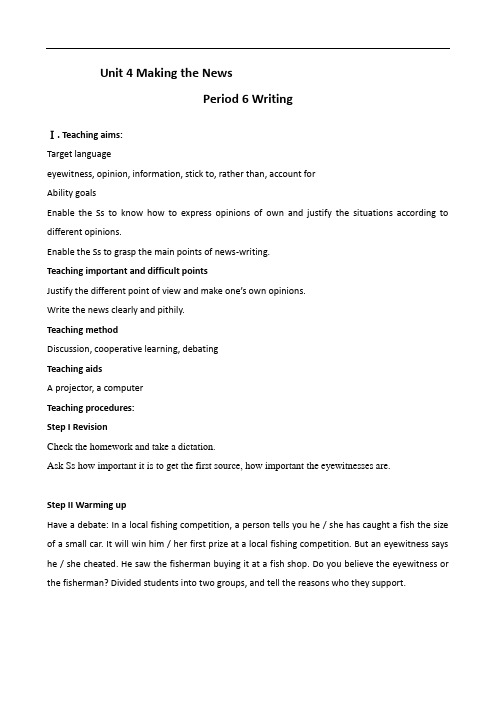
Unit 4 Making the NewsPeriod 6 WritingⅠ. Teaching aims:Target languageeyewitness, opinion, information, stick to, rather than, account forAbility goalsEnable the Ss to know how to express opinions of own and justify the situations according to different opinions.Enable the Ss to grasp the main points of news-writing.Teaching important and difficult pointsJustify the different point of view and make one’s own opinions.Write the news clearly and pithily.Teaching methodDiscussion, cooperative learning, debatingTeaching aidsA projector, a computerTeaching procedures:Step I RevisionCheck the homework and take a dictation.Ask Ss how important it is to get the first source, how important the eyewitnesses are.Step II Warming upHave a debate: In a local fishing competition, a person tells you he / she has caught a fish the size of a small car. It will win him / her first prize at a local fishing competition. But an eyewitness says he / she cheated. He saw the fisherman buying it at a fish shop. Do you believe the eyewitness or the fisherman? Divided students into two groups, and tell the reasons who they support.Step III Group WorkAsk students to work in groups of four and play one of the following roles each: CCTV Newsman / woman, Fisherman, Eyewitness, Reporter of Local Evening News. Make a dialogue in four and express their own opinions.Step IV PresentationAsk four of the students to express their own opinions.Step V Writing TaskFill in the form on page 68. List the facts and the opinions. Write about each fact and then write about the opinion. Try to follow the example and make the news clear and pithy or concise. Also let the Ss pay attention to the followings:State the situation of the story in paragraph 1;Set out what happened clearly in Paragraphs2 and 3;State how the story ended and your opinion on what happened in Paragraph 4.Allow the students enough time to work on their writing. (If there is a lack of time, leave the task.CCTV NewmanFishermanEyewitnessReporter of Local Evening News Explain the exciting story Stick to facts rather than opinions Accept the interview with the reporter Accounts for his/ her behaviour Accept the interview with the reporter Tell him what he/ she sawPrepare interview questions for thefisherman/woman and the eyewitness;Find out truth through your ownanalysis .for homework)A sample version:Fish StoryToday is the city’s annual Father’s Day Fishing Competition. Mr. Thompson took part in the fishing competition. He presented a very large and rare fish as big as a small car.Mr. Thompson said, “ It was quite by accident.”“I had a bite on the line. It was this wonderful fish. So, of course, I pulled it out of the water very quickly.” He added.However, an eyewitness said he had seen Mr. Thompson earlier in the day buying fish at the fish market. He said, “I saw the fisherman go into the shop and come out with this large, rare fish.”“Then he went to the judges and they weighed his fish and told him it was the largest so far”, said the witness.Mr. Thompson finally admitted he had bought the fish and had not caught it. He apologized in public and said that he only did it so his son would be proud of him as a fisherman. So it seems that it was Mr. Thompson who was the big fish!Step VI Homework1.Finish the writing work at home.2. Review the whole unit and prepare for a test.。
- 1、下载文档前请自行甄别文档内容的完整性,平台不提供额外的编辑、内容补充、找答案等附加服务。
- 2、"仅部分预览"的文档,不可在线预览部分如存在完整性等问题,可反馈申请退款(可完整预览的文档不适用该条件!)。
- 3、如文档侵犯您的权益,请联系客服反馈,我们会尽快为您处理(人工客服工作时间:9:00-18:30)。
教版新课标高二必修Book 5 Unit 4 Making the news—单元测试题第二部分:英语知识运用第一节:单项填空(共15小题;每小题1分,满分15分)21. We are not prepared to compromise _______ safety standards.A. withB. betweenC. onD. in22.Generaly speaking, when _______ according to the directions, the medicine hads no side effect.A. takingB. takenC. to takeD. to be taken23. The visiting cousins expressed their satisfaction with their tour, ______ that they had enjoyed their stay her.A. having addedB. to addC. addingD. added24. Would you classify it _______ a hard drug or a soft drug?A. intoB. byC. asD. apart25. I am delighted to _______ your acquaintance, Mr. Baker.A. makeB. putC. takeD. have26. Our holidays were mined by the weather; have stayed at home!A. it may be as wellB. it was just as well weC. we might just as wellD. we might do as well as we27. — Alice is visiting her mother today.— In that case, you have dinner with us tonight?A. willB. canC. won'tD. can't28. — Bob must be very wealthy.— Yes, he _______ more in one day than I do in a week.A. camsB. had earnedC. has been earnedD. has earnings29. It displeases my parents when Richard and I stay out late at night. My parents don't approve ____.A. of Richard and me staying out late at nightB. of me and Richard staying out late at nightC. to Richard's and my staying out late at nightD. when Richard and nm stay out !ate at night30. Be what you axe, give what you can, and the rest of the timeA. you can mind your own businessB. please mind your own businessC. you will mind your own businessD. mind your own business31. — Shall we eat here?— No, I don't like to cat at this restaurant, for the waiter gave me _______.A. a rare cooking steakB. a steak rarely cookedC. a steak rarely cookingD. a rare-cooked steak32. _______, where we can stay for a week.A. Next is another hotel to itB. Next to it another hotel isC. Next to it is another hotelD. it is next to another hotel is33. That was not the first time he ______ us. I think it's high time we _______ strongactions against him.A. betrayed (背叛), takeB. had betrayed, tookC. has betrayed, tookD. has betrayed, take34. Once ______, the clock will a month and keep good time.A. startB. startedC. to startD. starting35. - Does Alan like hamburgers?- Yes, very much _____ that he eats that almost every day.A. forB. asC. toD. so第二节:完形填空(共20小题;每小题1.5分,满分30分)阅读下面短文,掌握其大意,然后从36—55各题所给的四个选项(A,B,C,D)中,选出最佳选项,并在答题卡上将该项涂黑。
What makes a child speak a language has long been a puzzle to linguists (语言学家). 36 speaking, there are two schools of linguists, both of 37 try to explain 38 a child picks up a language so easily. The fact that a child picks up a language 39 is surprising: at one year old, a child is able to 40 "bye-bye"; at two, he is able to use fifty words; by three he begins to 41 tenses.The famous American linguist Noam Chomsky 42 that human beings have a sort of built-in system for language use, and that the 43 is only secondary. Children are not taught language 44 they are taught arithmetic. Other linguists, 45 , hold the view that a child learns 46 of his language from the hints in the environment. 47 , theorists of both schools 48 that there is a biological basis for language and language use. The 49 is which is more important, the inner ability or the environment. This is certainly a field 50 to be explored. Researchers from both schools are busy finding evidence to 51 their own theory, but 52 side is persuading the other. It seems that in order to 53 why a child learns a language so easily, we have to 54 the joint efforts of both schools. Some linguists, like De Villiers, have recognized the value of cooperation, and 55 linguists of both sides to work together.36. A. Surprisingly B. Personally C. Properly D. Roughly37. A. them B. who C. whom D. which38. A. that B. when C why D. how39. A. independently B. naturally C. without help D. with ease40. A. speak B. say C. wave D. respond41. A. master B. study C. have D. get42. A. doubts B. believes C. realizes D.criticizes43. A. help B. teacher C. environment D. hint44. A. as B. for C. when D. though45. A. in particular B. as a result C. however D. therefore46. A. a little B. some C. nothing D. most47. A. Before B. From now on C. Just now D. By now48. A. suspect B. disagree C. agree D. realize49. A. case B. quarrel C. problem D. question50. A. waiting B. planning C. never D. unlikely51. A. provide B. create C. supply D. support52. A. not a B. one C. neither D. either53. A. find out B. rule put' C. search for D. look for54. A. get rid of B. trust in C. rely on D. persist in55. A. ordered B. criticized C. challenged D. urged 第三部分:阅读理解(共20小题;每小题2分,满分40分)阅读下列短文,从每题所给的四个选项(A,B,C,D)中,选出最佳选项,并在答题卡上将该项涂黑。
